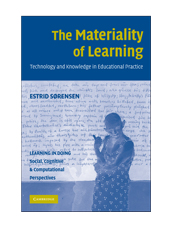2 - Components and Opponents
Published online by Cambridge University Press: 15 September 2009
Summary
The study of technology is a central aspect of the study of the materiality of learning – whether it is new or old, digital or non-digital. However, like most others who devote their research to the understanding of educational technology, my point of departure is digital technology. I take the issue of how to define technology as an empirical question. We start with the specific digital software that is the focus of this study: Active Worlds. How to account for this program and for technology in general is the focus of this and the following chapter. Consider the following two descriptions of Active Worlds:
Activeworlds is one of a number of Internet-based systems which allows users to interact with each other in virtual environments as avatars … Activeworlds is the only one of these systems which has allowed users to build in the environment, and thus hundreds of thousands of users have been shaping the emerging physical and human geographies of this set of virtual worlds. Activeworlds consists of hundreds of worlds (more than 500 at the time of writing), including Alphaworld, which is the largest, most highly developed, and most populated of these worlds.
(Schroeder et al. 2001, p. 570)The main feature of ActiveWorlds is that users can claim land and build, building is carried out using a selection of predefined objects from windows, doors and walls to trees, shrubs, and paving tiles. These objects can be cloned and placed on virtual land to create what is essentially a large virtual “Lego” set.
(Hudson-Smith 2001, p.78)- Type
- Chapter
- Information
- The Materiality of LearningTechnology and Knowledge in Educational Practice, pp. 30 - 61Publisher: Cambridge University PressPrint publication year: 2009



